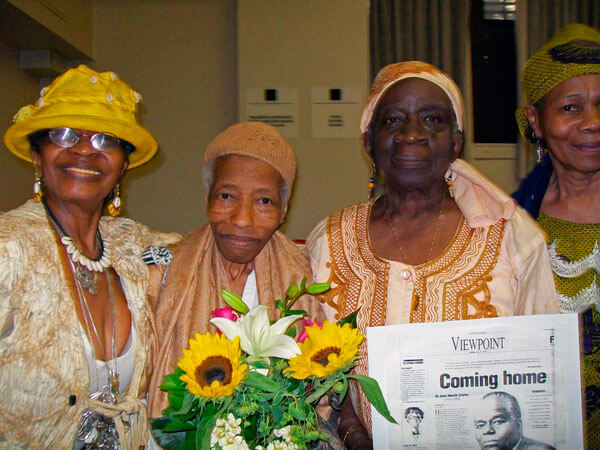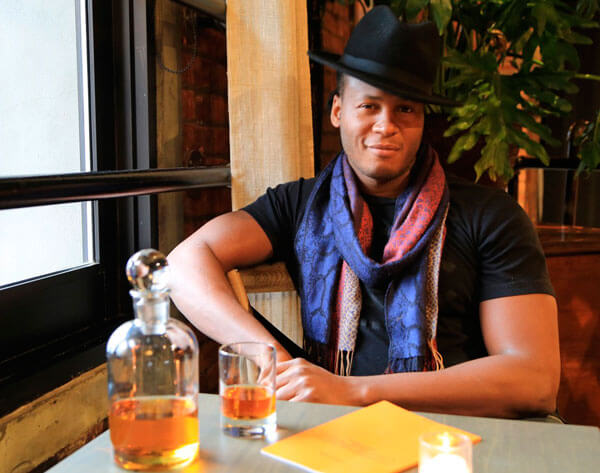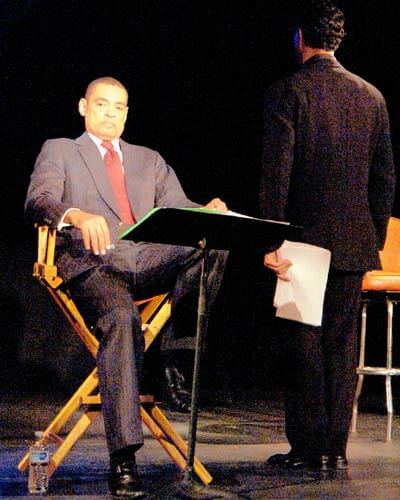The 100th birthday anniversary of Dr. John Henrik Clarke was marked by ceremonial tributes from his students and a plethora of nostalgic recollections of the Pan-African, educator, historian and cultural icon.
“He was my spiritual father,” New Jersey native and guest speaker Ted Boler said before launching into a detailed recount of his first and long-lasting relationship with the former Harlem resident and revered Hunter College professor.
Toler was an engineering student aspiring to accreditation when he first encountered the man he described to be the single most influence to impact his entire life.
“I had never heard anyone talk the way he did” — about Paul Robeson, James Baldwin and other African-Americans.
“I wanted to follow him around, just to learn,” Toler said.
Instead of returning home after what he described as a lecture series at his school, the young student conned his way to a ride back to Harlem where he had a one-on-one dialogue with the prominent historian.
Since that time, Toler said he has remained a fixture and disciple of Dr. Clarke’s philosophy.
He explained how he travelled far and wide gathering books for the educator and at least one occasion to a remote area in the mid-west where not a single African-American resided. There he was able to acquire reprints of rare manuscripts and books documenting African-American history makers.
There are 60 boxes of Dr. Clarke’s books waiting to be calogued at the Schomburg Library. And those represent a fraction of the vast collection the intellectual accrued during his lifetime.
Toler spoke during the 18th annual tribute to Dr. John H. Clarke at Countee Cullen Library, in Harlem.
Hosted by the Association for the Study of Classical African Civilizations, elders of its eastern region division ensured the pouring of libations, African drumming and promotion of a scholarship dedicated to students in pursuit of a career similar to that of the legendary historian.
LaTrella Thornton, Vena W. Baker, Derrick Hewitt, Hyacinth Miller, Harold Wright, Rose Crayton, George Turner, Genevieve Morales, Dr. Mario Beatty and the region’s presiding officer Debra M. Johnson gave assurances that annual tributes will be foremost to ASCAC’s mission of informing the community about African ancestors and their role in enhancing the advancement of the African community.
Shepherds of Dr. Clarke’s philosophy amplified a commitment by regaling his contribution to enlightening the Black community.
Modell Gault, Jr. travelled six hours from Buffalo, to attend the anniversary tribute. He said it was the least of his efforts to keep Dr. Clarke’s legacy in the minds of a generation that may not have ever met the iconic intellectual. Gault said his attention to Ghana, Africa and the rest of the continent is mostly attributed to the teachings of Dr. Clarke.
A personal dedication from Alton Maddox, Civil Rights advocate aka attorney-at-war and founder of United African Movement stated: “Dr. Clarke made a lifetime commitment to my struggle for Black advancement. It has continued incessantly since his transition in 1998. He should also be known as a philanthropist and a humanitarian. If other Blacks had made a similar commitment in 1998 to our struggle for liberation, I would have had the resources, years ago, to defeat white supremacy, ab initio over my unconstitutional disbarment.”
Dr. Clarke died of a heart attack on July 12, 1998, at the age of 83 but his legacy continues to revive his life-long message of Pan-African pride.
“Besides teaching at Hunter College and Cornell University, Clarke founded professional associations to support the study of Black culture. He was a founder with Prof. Leonard Jeffries and first president of the African Heritage Studies Association, which supported scholars in areas of history, culture, literature and the arts. He was a founding member of other organizations to support work in Black culture: the Black Academy of Arts and Letters and the African-American Scholars’ Council,” Wikipedia states.

























